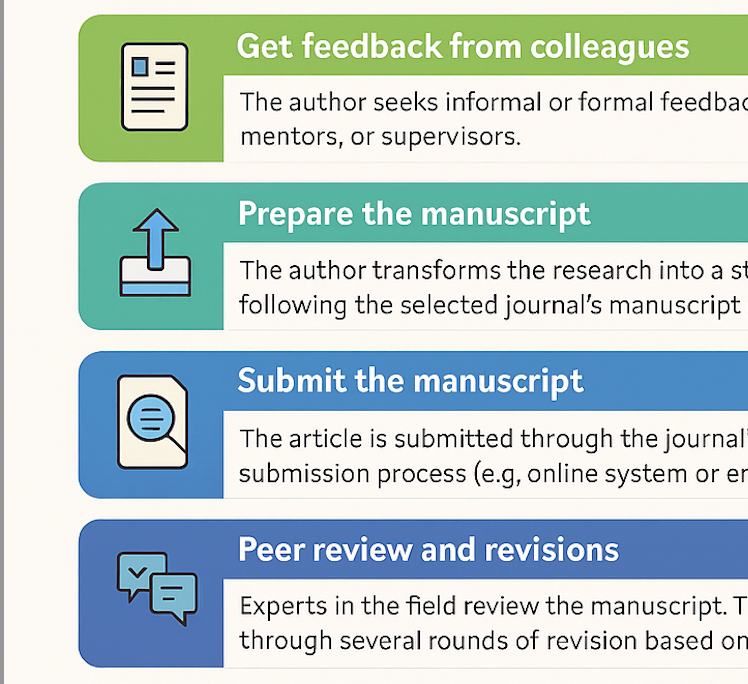
Protecting your research: identifying legitimate journals and avoiding predatory authorship
Steps in publishing a good journal article
- Conduct ethical, original research and analysis – The author carries out rigorous research grounded in ethical principles and produces meaningful, authentic findings.
- Select a suitable academic journal – The author evaluates and chooses the most relevant journal and prioritise African journals where appropriate, to support the local publishing industry and contribute to decolonising knowledge.
- Get feedback from colleagues – Before writing the manuscript, the author seeks informal or formal feedback from peers, mentors, or supervisors to strengthen the work.
- Prepare the manuscript – The author transforms the research into a structured article following the selected journal’s manuscript guidelines and beware of using generative AI tools to do the work for you – ensure the work reflects your own analysis, voice, and insight.
- Submit the manuscript – The article is submitted through the journal’s official submission process (e.g. online system or email).
- Initial editorial review – The editor (or editorial assistant) screens the manuscript and decides whether to reject it, return it for revision, or send it for peer review.
- Peer review and revisions – Experts in the field review the manuscript. The author may go through several rounds of revision based on reviewer comments until the editor accepts the final version.
- Formatting and typesetting – The accepted article is formatted into the journal’s publication template for print or digital versions (PDF, HTML, EPUB, etc.).
- Copy editing – A professional copy editor improves grammar, language, structure, and style while preserving the author’s meaning and voice.
- Author proofreading: The author reviews the final version to approve corrections or make final adjustments before publication.
- Printing and distribution – The journal article is printed (for hard copy publications) and/or digitally distributed through the journal’s website or academic databases.
- Public access and readership – The article becomes available to readers, who may access it through open access, subscriptions, libraries, or institutional repositories.
Predatory journals, how to spot them
| Step in legitimate publishing | How predatory journals skip or manipulate the step | Effects |
|---|---|---|
| 1. Conduct ethical, original research | Accept low-quality, plagiarised, or fabricated research | Undermines academic integrity; spreads false or harmful information |
| 2. Select a suitable, reputable journal | Mislead authors with fake impact factors, names mimicking real journals | Wastes authors’ work; damages reputation; not recognised by institutions |
| 3. Get feedback from colleagues | Discouraged or ignored; no peer dialogue | Research remains unrefined; lacks critical insight |
| 4. Prepare the manuscript carefully | Accept sloppy, unstructured submissions; no guideline enforcement | Poor presentation and readability; hard to follow |
| 5. Initial editorial review | Accepts everything or auto-accepts in hours without real review | No quality control; irrelevant or weak work gets published |
| 6. Peer review and revisions | No real peer review; sometimes fake reviewers or no reviewer feedback | Errors and weak arguments go unchallenged; no scholarly improvement |
| 7. Formatting and typesetting | Minimal or absent; raw documents uploaded as-is | Poor professional appearance; lack of consistency |
| 8. Copyediting | Skipped; language and grammar errors remain | Unprofessional; harder to cite or build on; author credibility reduced |
| 9. Author proofreading | Authors not involved in final review | Mistakes go uncorrected; loss of control over final publication |
| 10. Legitimate distribution and access | Paywalls with little visibility; not indexed in credible databases | Articles not found or cited; little academic impact; hinders knowledge sharing |
Predatory writers, how not to be one
| Unethical practice by author | How it happens | Consequences |
|---|---|---|
| Faking or fabricating data | Inventing results or manipulating data to get desired outcomes | Misleads the field; may cause real-world harm; career-ending if exposed |
| Plagiarising others’ work | Copying texts, ideas, or results without proper citation | Legal and ethical violation; ruins credibility; retractions and blacklisting |
| Using AI to write entire articles | Submitting AI-generated content without proper review or attribution | Undermines academic originality; misrepresents authorship |
| Submitting the same article to multiple journals | Trying to increase chances of acceptance or exposure | Double publishing is unethical; leads to retractions and damaged reputation |
| Paying for fake authorship | Paying to be added as an author without doing the work | Violates authorship criteria; misrepresents contribution |
| Adding honorary or guest authors | Including someone as an author just for prestige or connections | Unethical; distorts credit and accountability |
| Citing excessively for self-promotion | Including irrelevant self-citations or friend-citations to boost metrics | Skews citation impact; unethical metric manipulation |
| Targeting predatory journals knowingly | Choosing quick, pay-to-publish venues despite knowing they skip peer review | Weakens academic standards; research not respected or used |
| Ignoring ethical approval for studies | Conducting research without clearance from ethics boards | Violates human subject protections; risks legal consequences |
| Ghostwriting or outsourcing research | Hiring others to write or conduct research and claiming it as one’s own | Misrepresents authorship and expertise; undermines trust |
In conclusion, the steps for legitimate publishing in an academic journal are:

Use the form below to subscibe to Owia Bulletin.
Discover more from Africa Social Work & Development Network | Mtandao waKazi zaJamii naMaendeleo waAfrika
Subscribe to get the latest posts sent to your email.



